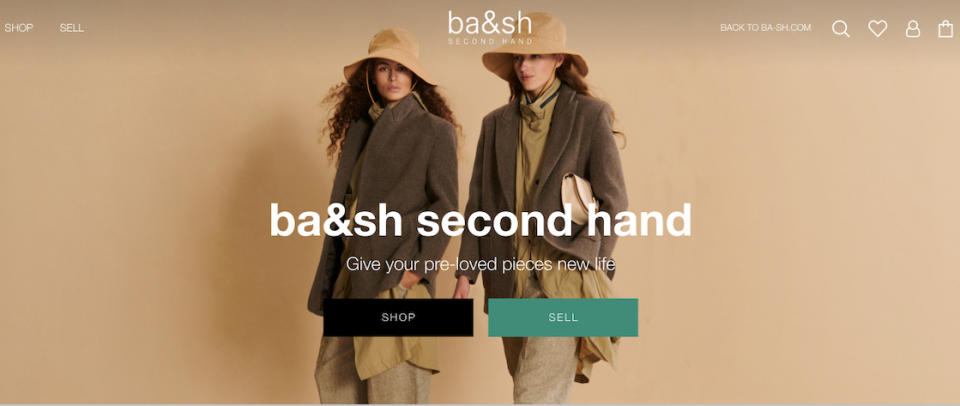Resale Joins Rentals at Ba&sh

Brands are starting to take resale into their own hands.
And rightfully so: the global market value of secondhand and resale apparel was estimated to be worth $96 billion, projected to rise rapidly and more than double in size, reaching a value of $218 billion by 2026, Statista reported. ThredUp’s 2022 Resale Report found that brands with their own resale shops increased 275 percent, from eight in 2020 to 30 in 2021.
More from Sourcing Journal
“[Resale] is an incredibly fast growing segment of retail; it’s expected to grow by $100 billion in the next five years as a segment and growing five times faster than retail overall,” Emily Gittins, co-founder and CEO of Archive, said. “So with that, we’re seeing a lot of brands recognizing that there is a huge growth opportunity for their business and owning that part of the customer experience, both from a direct revenue perspective of being able to participate in the second, third, fourth transaction of an item, but also in owning the customer data and new customer experience, being able to bring customers back to their ecosystem to resell as opposed to going to third parties.”
Archive, whose software helps brands launch resale programs, expects that a lot of that growth projected for the next five years will come from brands themselves launching their own programs and growing significant business from internal circularity.
The momentum is starting to build.
French fashion brand Ba&sh is using Archive’s technology to launch Ba&sh Second Hand in the United States.
“Our sustainability initiative began almost 10 years ago, and I think the conversation around resale is actually really important because our initiative [is] ultimately building a lifestyle brand that feels incredibly authentic to the original roots,” Desiree Thomas, CEO of Ba&sh North America, said. “It’s a special place to be a part of because we really are pushing the envelope when it comes to thinking more holistically about what a brand experience feels like.”
Resale felt like a natural next step for the French company. Ba&sh Second Hand actually launched last year in France and saw nearly 30 percent new customers within the first two months, with 99 percent of resale credit redemptions happening in-store. But what will drive U.S. customers to use a new platform versus established marketplaces like Depop or Poshmark or storefronts like Buffalo Exchange?
For starters, Ba&sh Second Hand aims to be an easier and more user-friendly listing experience than other resale sites with fewer listings available, creating less competition for the seller and a straightforward approach for the buyer. Users upload their garments to the peer-to-peer site, pay for a shipping label and send their items out. Sellers can choose to receive 70 percent of the proceeds in cash or 100 percent in store credit.

Courtesy
In addition, Ba&sh will pilot an omnichannel element to its U.S. program by extending a luxury, white-glove service to its VIP customers in select cities. These customers can drop off any pre-owned piece at their local Ba&sh store and the retailer will take care of reselling it for them online via Archive. The pilot program will launch next month, starting with Ba&sh’s flagship boutiques in New York City.
“We want to encourage a drive-to-store opportunity for customers that may not be as familiar with the resale process,” Thomas said. “So we’re using it as an educational opportunity to let our clients know this is a service we’re offering. We’re really looking at this as service for our customers, to be able to have a hands-on approach if they don’t have the time or ability to upload their items [themselves].”
Ba&sh will gauge demand for the white-glove service after it starts at Manhattan’s Nolita and Madison Avenue stores to determine where and when the program expands, using data to understand if resale will work best in high-performing store or in big-city locations.
“From our perspective, Ba&sh is really an incredible partner and dream partner for Archive because they truly believe in circularity and walk the walk of their sustainability strategy,” Gittins said. “It’s been really fun to have conversations with the team on how they see circularity playing into the future of the brand and how important it is to them.”
The French label launched Ba&sh Borrow in 2021, a mono-brand rental offering with CaaStle, allowing U.S.-based customers to rent and wear the brand’s pieces as often as they like for “a fraction of the price” of purchasing an item new. CaaStle, a B2B “Clothing-as-a-Service” technology platform, has launched rental programs for brands including Ralph Lauren and Rebecca Minkoff. Ba&sh is going to launch its next collection on Borrow later this month.
Ba&sh joins a growing list of brands choosing to own their resale platforms.
Last month, Canada Goose debuted its recommerce platform Canada Goose Forever, powered via Trove. Francesca’s announced Forever Francesca’s, a 360-resale platform powered by ThredUp. In December, The North Face partnered with Archive and raised $15 million to make the resale “not suck.” Even Shein got into the rinse-and-repeat resale game, creating a secondhand site from the provider behind Boyish’s resale platform. During the NRF trade show to kick off the year, J.Crew announced a platform in partnership with ThredUp, giving shoppers access to the brand’s secondhand goods.
